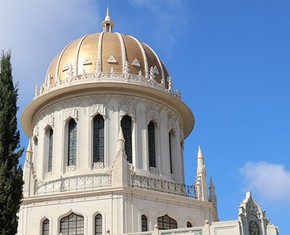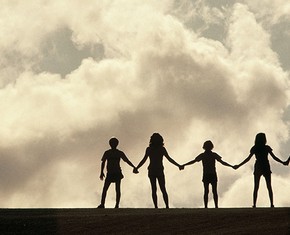The views expressed in our content reflect individual perspectives and do not represent the authoritative views of the Baha'i Faith.
I have two particularly vivid memories of growing up as a Christian, which have stayed with me even as I decided to become a Baha’i.
One is my recollection of the evening prayer sessions conducted by my grandfather when we visited him and our cousins in Arkansas. The second is the time that my mother surprised and amazed me when she spoke in tongues during a Sunday evening service at our church, the Southside Assembly of God in Odessa, Texas.
Both of these events and others I experienced had meaning for me, informed my spiritual life as an adult, and created a love for and appreciation of my Christian heritage – all of which helped me become a Baha’i:
When Christians act according to the teachings of Christ, they are called Baha’is. For the foundations of Christianity and the religion of Baha’u’llah are one. The foundations of all the divine Prophets and Holy Books are one. The difference among them is one of terminology only. Each springtime is identical with the former springtime. The distinction between them is only one of the calendar – 1911, 1912 and so on. The difference between a Christian and a Baha’i, therefore, is this: There was a former springtime, and there is a springtime now. No other difference exists because the foundations are the same. Whoever acts completely in accordance with the teachings of Christ is a Baha’i. – Abdu’l-Baha, The Promulgation of Universal Peace, p. 248.
My grandpa, Henry Steele, was a lay preacher in the Ozark Mountains in Northwest Arkansas, near Huntsville. As a lay preacher, he was self-taught about the Bible and Christianity, and in addition to earning his living as a farmer, he gave sermons and performed other ministerial services through what he perceived as God’s will.
As a young boy of six or seven, the evening prayers led by my grandfather made a big impression on me. He prayed and prayed and then prayed some more. The floors in the house were hard and wooden, and we kneeled on them in our summer shorts and bare knees with our heads bowed. His prayers probably didn’t last as long as it seemed, but it seemed like an eternity.
Grandpa would pray some general prayers of thanksgiving and worship of God and Jesus, and then go person by person among his family and friends, asking for God’s blessing and support as they made their way through life. My grandfather was loving and kind to all his grandchildren during our visits to the home he shared with my aunt, uncle, and cousins. Once Grandpa saved all of us children from a certain dire parental punishment when he hid us in the root cellar after we rolled in the mud from a big summer rain. Grandpa got the hose and washed us off, alleviating some of the worst of the muddy mess we had made of our best clothes, and he ran interference with the adults when they returned and learned of our misadventures.
Grandpa Steele had a very strict and some would say conservative view of his relationship with the Lord. For example, he didn’t go the doctor or seek medical attention of any kind when he was ill. His view was that God would take care of him as God saw fit, so he left his health in God’s hands. Sadly, he had a growth on his hand that turned cancerous and led to his untimely death. Tragic, yes, but he was a believer and stood firm in his beliefs.
My family attended Southside Assembly of God Church in Odessa, Texas when I was a child. Everyone there in the church was “Brother” this and “Sister” that, like family, and it seemed to me that genuine love and compassion existed among the congregation. I remember that our preacher Brother Bozeman came to visit me when I was in the hospital with pneumonia at the age of seven. I really liked it when he came and showed concern for me and my recovery – it made me feel important and valuable.
The church leaned Pentecostal in its Christian teachings, believing in healing, baptism, and speaking in tongues. They also seemed to feel a special spiritual connection to God. One way that connection manifested itself was when members of the congregation, and sometimes the pastor, spoke in tongues. This seemed strange but fascinating to me as a child, and honestly kind of gave me a break in the doldrums of the regular everyday nature of the church experience.
Mrs. Mayo, a long-time member of the church, seemed to be the one who did most of the talking in tongues. She delivered messages from the Holy Spirit that were translated or interpreted by others also in tune with her spirit-filled experience at that moment. The messages were generally uplifting, sometimes cautionary and urgent, but a special feature of the church services when these happenings occurred.
I remember clearly the time my mother stood up and began speaking in tongues. I was amazed and thrilled that my mom was taking such a leading role for once in the service. I don’t remember the content of what she said, but I do remember being proud of her and enthralled that she felt the Holy Spirit move her in that way.
I loved growing up Christian – I loved the children’s song that goes “Jesus loves the little children, all the children of the world. Be they yellow, black, or white, they are precious in His sight.” That sentiment resonates with me today as I embrace the oneness of humanity as a major teaching of the Baha’i Faith. I loved being told repeatedly not to “hide my light under a bushel.” I wasn’t sure what a bushel was, and still am not, but I had the sense that I must carry myself as proud believer in God and let my belief or light stand out as I went through the world.
I also loved the Christian emphasis on love and on forgiveness, the emphasis on caring for the poor and the downtrodden, with “the meek inheriting the earth,” and Jesus as a social warrior and religious reformer. For example, Christ threw the money changers out of the temple, upsetting the corrupt old order that they represented and setting the stage for a renewed belief system.
As a high school teacher for years in Odessa, Texas, I taught many students raised as Christians, and they were great kids – honest, sincere, hard-working and just all-around wonderful in their interactions in the school setting. Many of the Christian kids seemed different in a positive way, not doing some of the bad things and self-destructive behaviors that plagued too many of their peers. I always appreciated them and the efforts their parents and families had made to teach them right from wrong and to have a moral compass and foundation in their young lives:
… unless the moral character of a nation is educated, as well as its brain and its talents, civilization has no sure basis.
As religion inculcates morality, it is therefore the truest philosophy, and on it is built the only lasting civilization. … The Christian Teaching was illumined by the Divine Sun of Truth, therefore its followers were taught to love all men as brothers to fear nothing, not even death! To love their neighbours as themselves, and to forget their own selfish interests in striving for the greater good of humanity. The grand aim of the religion of Christ was to draw the hearts of all men nearer to God’s effulgent Truth.
If the followers of the Lord Christ had continued to follow out these principles with steadfast faithfulness, there would have been no need for a renewal of the Christian Message, no necessity for a re-awakening of His people, for a great and glorious civilization would now be ruling the world and the Kingdom of Heaven would have come on earth. – Abdu’l-Baha, Paris Talks, pp. 31-32.
















Comments
Sign in or create an account
Continue with Googleor